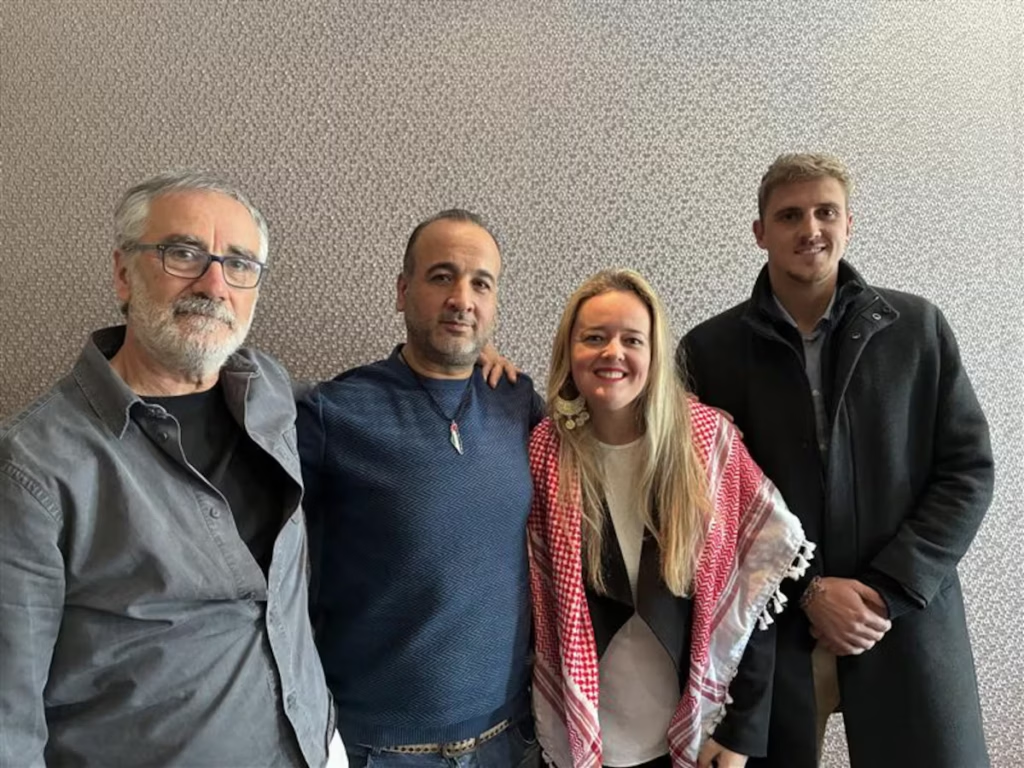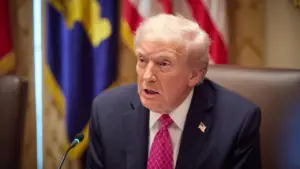
Refaat Alathamna’s story seems like something out of a horror film in which he is the protagonist who, almost by miracle, makes it to the end credits. Accompanied by his wife, his five children and a sixth waiting to be born, this doctor from Gaza landed this Monday in Madrid, where they were received by members of the NGO Messengers of Peace, who managed to get them out of the Strip. Until then he found himself between two worlds: that of his past, in Gaza, and that of his future, in Spain. He spent the last two years in the Strip working in what remained of Gaza’s health system and fighting for his survival and that of his family, sharing his journey on social networks. Last Wednesday, in a Madrid hotel, he shared the story of a father and a doctor in one of the deadliest areas on the planet: “There is no place where you are safe in Gaza.”
Daily bombings, collapsing health systems, rubble… Alathamna remembers every day as one in which she had to fight to survive. From fetching a glass of clean water to getting enough money to buy one of the boxes of humanitarian aid, distributed in areas sometimes difficult to access due to Israeli attacks… Obtaining the resources to meet his family’s basic needs has become a dangerous mission. And then you could get something: “Israel made the Palestinians’ money useless. There was nothing to buy. A kilo of sugar cost 200 euros.” Sometimes the doctor paid exorbitant prices to get food: almost seven euros for a single egg and around 30 for a kilo of flour. “Gaza is not suitable for life,” he laments.
Messengers of Peace worker Lorena Santana, one of the first people to contact Alathamna through the TikTok platform, in 2024, shared the journey of the doctor, who was unable to hold back his tears. “It’s a miracle that Refaat is here,” he exults. When they met, the doctor was living with his family in Rafah, where they were taking refuge from the bombing. He wanted to help him leave the Strip and take him to Spain. He spent months processing his and his family’s relocation and created the Hello Gaza organization to raise the funds needed to achieve this goal. To enter Egypt you needed around 30 thousand dollars (almost 26 thousand euros). “We had to confront all the political institutions, shout at the governments,” he says.
The Spanish director Javier Fesser also contacted the doctor through the networks. “On June 27 at 1.29pm I sent him a message that said: ‘Hello, Dr. Refaat Alathamna. I am Javier Fesser, a Spanish director. I live in Madrid. I would like to take you with you. How could I do this? Is there any mechanism by which I could ask for your departure from Gaza? I can take your family in and take care of them for a while. Help you in any way I can. I hope you are well. I await your A big prayer, from of someone who closely follows the terrible injustice you are suffering there.
He received an almost immediate response and the two men have not been out of touch since. “Refaat is the living and current testimony of the horror that is suffered in Gaza,” he underlines.
The worst thing, according to the doctor, was seeing the situation the children found themselves in: “They scream looking for their father or mother, and they are no longer there. They are orphans without parents and seriously disabled due to the amputations they had to undergo.” When he worked in hospitals – when they were still standing – he never saw one or two wounded arrive, but dozens at a time. There were all kinds of cases, he claims, because all kinds of weapons were used. “Not a night went by without attacks, you couldn’t sleep peacefully. You sleep with your eyes open,” he adds.
What changes have you perceived after the peace plan promoted by the president of the United States, Donald Trump, came into force at the end of September? It strives to highlight notable changes worth celebrating beyond the reduction in the number and frequency of attacks. “The blockade (in the Strip) remains the same. Those who most need to leave (Gaza) are the wounded and the sick, but those who manage to do so are very limited and are those who, like me, have dual nationality. They were evacuated through Israel with the help of its embassies,” he underlines.
Fesser believes that the US plan and the alleged truce reached are “false”. “In 40 days (since the ceasefire was agreed) there have been 400 violations of the ceasefire by Israel. That is 10 times a day!”, he condemns.
As in many other cases in Gaza, Alathamna survived thanks to aid received from abroad. “Israel is limiting the work of aid workers, they are trying to wipe out everything alive in Gaza,” he says. And remember the days when this idea of ending everything became the only desire of the Palestinians: “Many people wanted to die now.”
Alathamna wants to continue practicing as a doctor and take her children back to school. He admits that he is worried about the consequences that the war will leave on his children: “They need psychological support, to go to school, to adapt.” Still overwhelmed by the emotion of what he experienced in Gaza, he assures that it is time for him and his family to start from scratch. “During those two years my tears didn’t stop, but they have stopped now. I feel like we’re finally safe,” she says.
Although Alathamna managed to leave Gaza, with the unfailing support of the NGO and volunteers like Fesser, that doctor lost several family members and friends during the war. Others – including his mother, who had a stroke, and 12 siblings – are still there.




